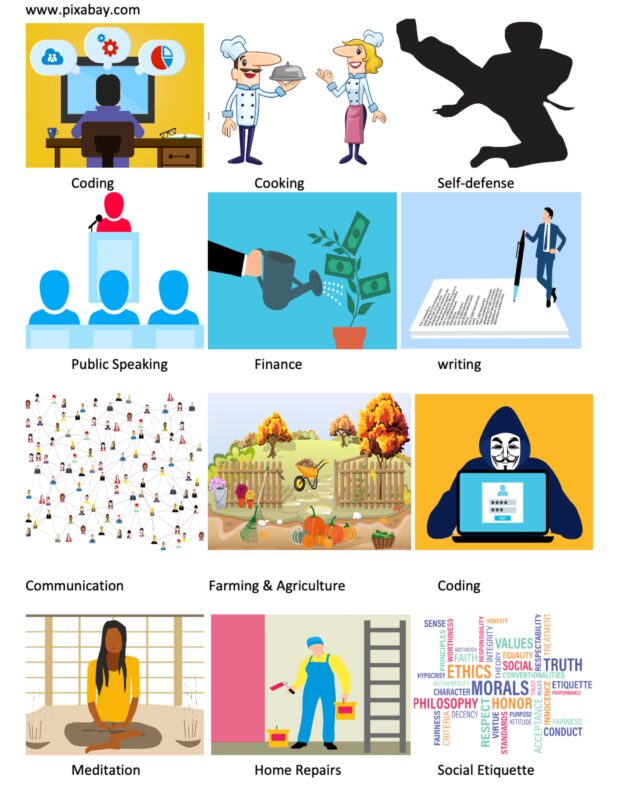Skills we should be teaching our children in school
First of two parts
In an era characterized by rapid technological advancements, evolving global challenges, and an ever-changing job landscape, the conventional subjects taught in schools are undergoing a profound transformation.
As co-managing partner in a law office that actively mentors young lawyers, a teacher in law school, and a parent to two children (one in grade school and another in high school), I recognize the importance of adjusting our focus to equip the future generation with essential skills and knowledge needed to thrive in the modern world. These encompass a blend of traditional and non-traditional academic, and technology-driven skills.
From digital literacy to environmental science, financial literacy and beyond, let’s explore the subjects or skills that students should be learning today to thrive in our ever more interconnected and technology-driven world.
1. Writing
Good writing, communication and interpersonal skills and public speaking are the backbone of effective expression and connectivity.
Post-pandemic, it seems that a lot of our students are now using tablets without keyboards in their English classes. But a tablet does not encourage lengthy writing and instead encourages short, abbreviated and quick texts or short sentences. It just can’t compare to typing on a laptop or keyboard.
When I was still in school, I remember going through so many notebooks and notepads every semester. Each subject would have a dedicated notebook and every so often, I would go to the bookstore to have to buy a new notebook because I had already finished filling up the current one with all my notes. These days, many students have barely anything written on their notebooks even at the end of a semester, such that they can even be used for the next semester.
A study of university students and recent graduates revealed that writing on physical paper can lead to more brain activity when remembering the information an hour later. Researchers say that the unique, complex, spatial and tactile information associated with writing by hand on physical paper is likely what leads to improved memory. (https://www.sciencedaily.com/releases/2021/03/210319080820.htm)
This trend of writing less does not only apply to taking notes or reminders but also to writing in general, such as writing essays, articles, stories, and narrations.
Accordingly, our schools should give more thought to how our students can best hone their writing skills, even if it means limiting Ipad use in their classes.
2. Communication, interpersonal skills & public speaking
The COVID pandemic has allowed us to use technology to work from home and hold online classes. There is also the trend of homeschooling where students are taught by their parents at home. While technology has made work and classes more convenient and efficient, it has also had the unintended effect of allowing us to work alone and in the privacy of our own homes, effectively isolating us from one another.
We had a lawyer in the office who resigned and his reason was that he had accepted an offer from another firm where he could do purely online work.
It is also not unusual to see people in restaurants, eating together in one table, but not really talking to each other as they are all focused on their cellphones.
Children today communicate through the various social media applications such as Discord, Instagram, and other apps, and some even feel can be close or best friends with someone, without having to meet each other in person.
While technology through the various social media platforms has allowed us to easily connect with more people, in some ways, the quality of our interaction has undeniably been reduced.
The result is that more people are socially awkward and find it stressful when placed in situations where they have to interact with others in social events. Many children and young adults find it challenging to simply interact with people outside their usual circle.
Aside from developing communication skills, students should also be exposed to speaking in public, and this is best done in person, before an audience, rather than online. There is a need to expose our students and younger generation to more opportunities to interact with and speak with groups of people to develop their communication skills, and the best place to start is in school.
Effective communication skills facilitate collaboration, understanding, empathy, and lays the groundwork for successful interactions in personal, professional and social spheres. Ultimately, mastering these skills empowers our youth to navigate complex situations, excel and thrive in the world and contribute and inspire others.
3. Coding, computer programming & cybersecurity
Given the increasing role of technology in our daily lives, schools should prioritize the early introduction and teaching of computer science, coding and programming, to ensure students are equipped for the digital age.
Filipinos have a natural talent for creativity and the arts. With the right training, support, and infrastructure, we also have the ability to excel in programming and coding. Therefore, basic programming concepts, web development, data science, different programming languages, and applications development are important subjects to be taught in our schools.
The goal of these classes should not only be to teach specific programming languages but also to cultivate problem-solving abilities, logical thinking, creativity and adaptability in students which will prepare them for a technology-driven future.
(To be continued next week)
(The author, Atty. John Philip C. Siao, is a practicing lawyer and founding Partner of Tiongco Siao Bello & Associates Law Offices, an Arbitrator of the Construction Industry Arbitration Commission of the Philippines, and teaches law at the De La Salle University Tañada-Diokno School of Law. He may be contacted at jcs@tiongcosiaobellolaw.com. The views expressed in this article belong to the author alone.)
